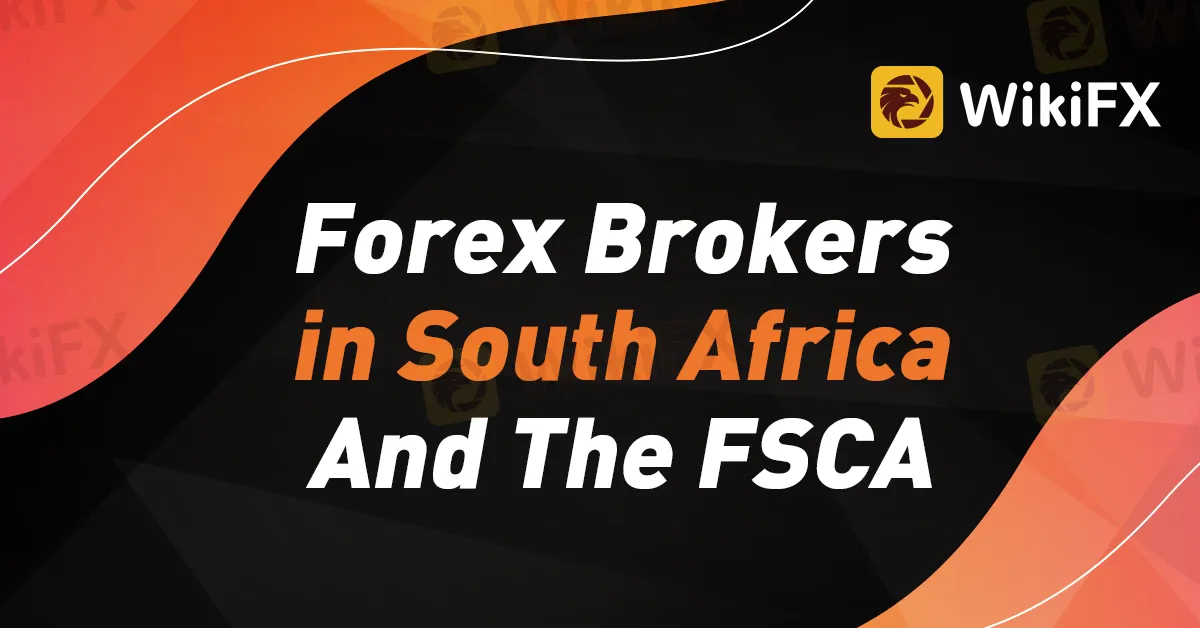简体中文
繁體中文
English
Pусский
日本語
ภาษาไทย
Tiếng Việt
Bahasa Indonesia
Español
हिन्दी
Filippiiniläinen
Français
Deutsch
Português
Türkçe
한국어
العربية
Forex Brokers in South Africa And The FSCA
Abstract:The main regulatory body for forex trading in South Africa is the Financial Sector Conduct Authority (FSCA), which was established in April 2018 as a merger of the Financial Services Board (FSB) and the Financial Advisory and Intermediary Services (FAIS) division of the FSB. The FSCA is responsible for regulating and supervising the financial services industry in South Africa, including forex brokers.

The main regulatory body for forex trading in South Africa is the Financial Sector Conduct Authority (FSCA), which was established in April 2018 as a merger of the Financial Services Board (FSB) and the Financial Advisory and Intermediary Services (FAIS) division of the FSB. The FSCA is responsible for regulating and supervising the financial services industry in South Africa, including forex brokers.
The WikiFX forex broker investigation tool enables users to access all licenses and regulatory documentation for brokers, review and rate brokers, follow forex news and learn about currency trading. The app can be found on both the App Store and Google Play.
In order to operate in South Africa, forex brokers must be registered with the FSCA and hold a valid license. Brokers must also comply with strict capital requirements and financial reporting rules and are subject to regular audits and inspections to ensure compliance with the regulations.
The FSCA has also put in place measures to protect consumers from fraud and financial crimes. For example, it has published a list of unregistered forex brokers and has warned consumers against dealing with these firms.
In addition, the FSCA has also issued guidelines on how forex brokers should deal with clients, including the requirement to provide clear and concise information on the risks involved in forex trading, and to ensure that clients are fully aware of the risks before they start trading.
Forex trading is a high-risk and speculative activity, and it is important for investors to be fully informed and aware of the risks before they start trading. They should also be careful when choosing a broker and ensure that the broker is regulated and licensed by the FSCA.
It's also important to note that, as with all forms of investing, past performance is not an indication of future results, and you should always do your own research and seek professional advice before investing any money.
In summary, Forex trading in South Africa is regulated by Financial Sector Conduct Authority (FSCA). Forex Brokers must be registered with the FSCA and comply with strict capital requirements and financial reporting rules. The FSCA also protects consumers from fraud and financial crimes. As an investor, it's important to be fully informed and aware of the risks before starting trading and to choose a broker that is regulated and licensed by the FSCA.

Disclaimer:
The views in this article only represent the author's personal views, and do not constitute investment advice on this platform. This platform does not guarantee the accuracy, completeness and timeliness of the information in the article, and will not be liable for any loss caused by the use of or reliance on the information in the article.
Read more

Interactive Brokers Launches Forecast Contracts in Canada for Market Predictions
Interactive Brokers introduces Forecast Contracts in Canada, enabling investors to trade on economic, political, and climate outcomes. Manage risk with ease.

Bank Negara Malaysia Flags 12 New Companies for Unauthorised Activity
Bank Negara Malaysia (BNM) has updated its Financial Consumer Alert List (FCA List) by adding 12 more entities, reinforcing its efforts to warn the public against unregulated financial schemes. Check if your broker made the list!

The Withdrawal Trap: How Scam Brokers Lure Victims into Paying More
In the world of online trading, the promise of quick profits and seamless transactions often masks a darker reality. One of the most insidious tactics employed by fraudulent brokers is blocking withdrawals, that is a deliberate strategy designed to trap traders and investors into paying more money under false pretences.

RM1.29 Million Lost in ‘C Baird VIP’ WhatsApp Scam
A 43-year-old company auditor and subcontractor in Malaysia became the latest victim of an elaborate investment scam after losing RM1.29 million to a fraudulent scheme promoted via WhatsApp.
WikiFX Broker
Latest News
The Withdrawal Trap: How Scam Brokers Lure Victims into Paying More
FCA to Investors: Think Twice Before Trusting These Brokers
Trump\s tariffs: How could they affect the UK and your money
Trump gambles it all on global tariffs he\s wanted for decades
TradingView Brings Live Market Charts to Telegram Users with New Mini App
Trump tariffs: How will India navigate a world on the brink of a trade war?
Interactive Brokers Launches Forecast Contracts in Canada for Market Predictions
Authorities Alert: MAS Impersonation Scam Hits Singapore
Stocks fall again as Trump tariff jitters continue
IG Group Acquires Freetrade for £160M to Expand UK Investment Market
Currency Calculator







